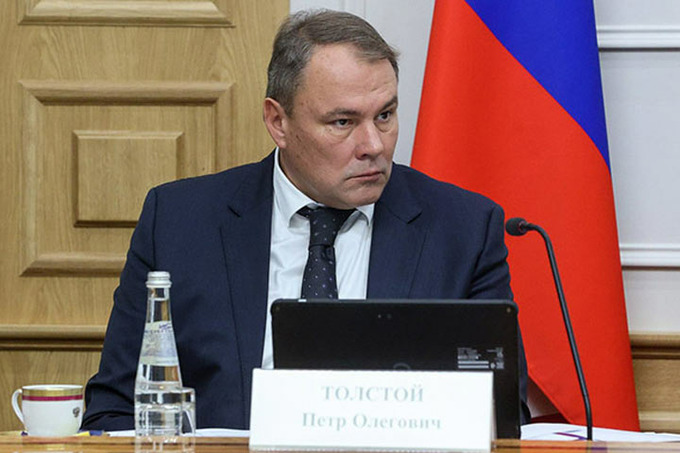Deputy Chairman of Russia’s State Duma Pyotr Tolstoy has proposed to legally restrict employment in Russia of citizens from countries where Russian is not the official language.
He put forward this proposal in the parliamentary hearings on “State policy in the sphere of preservation, protection and development of the Russian language: state, problems and ways of solution,” which were held on November 14 in the Federation Council. Part of his speech is published on the website of the State Duma.
Pyotr Tolstoy raised the question of Russian language teaching in post-Soviet countries. He noted that while Russia wants Russian to be taught there, “English language is being actively taught in these republics and Russian speech is also trying to be supplanted with their national languages.”
The deputy chairman of the State Duma is convinced that Russian authorities could influence the issue with determinant legislative decisions.
“If Russian is not the state language, then, apologies, citizens of these countries should not work for us in public places — drivers, salesmen, couriers — such responsible work is not for them. Such measures correct the situation step by step,” he stated.
He said many in Russia believe that soft power is when “we just smile and open our beautiful Russian educational institutions everywhere, recruiting those who are still capable of teaching Russian in the republics.” “Part of soft power is in the restrictions that must be imposed on certain things,” he believes.
The deputy emphasized that “Russian should be the language of interethnic communication on the territory of all former Soviet republics.”
“Today Russian as a language of interethnic communication is used only in Belarus, Kazakhstan and Kyrgyzstan. But in Armenia, Uzbekistan, Tajikistan and other states it is not. And it should not be at our expense to build Russian-language schools there, to develop the Soviet integration system „mortified“ in the 1990s, and I suggest to do it independently at the expense of the aforementioned states, from the income that their citizens send to their homeland, working in Russia,” said Tolstoy.
 Bobur Bekmurodov
Bobur Bekmurodov
Bobur Bekmurodov, a deputy of the Legislative Chamber of Oliy Majlis of Uzbekistan and chairman of the nationwide Yuksalish (Rise) movement, followed up by saying that “Uzbekistan is not Deputy Tolstoy’s backyard.”
“Let him deal with the problems of his citizens and his country. In Uzbekistan, Russian is the language of free communication. We comply with the status of an allied country. Tolstoy does not,” wrote Bobur Bekmurodov.
The parliamentarian highlighted that Uzbekestanis pay a patent for working in Russia.
“It is not your responsibility to distribute the money they send to their families. As for our Russian-speaking compatriots, we will take care of them ourselves,” he added.
Alisher Kadirov, deputy speaker of the Legislative Chamber and leader of the Milliy Tiklanish (National renewal) party, inquired of Tolstoy’s statement: “Should we suggest firing employees who do not speak Uzbek? We will go another way — we will teach them the Uzbek language. And you yourselves will learn to work. This may someday lead to real respect for the Russian language,” he commented.
In September, Russian deputy Yevgeny Fyodorov argued that the former Soviet republics left the USSR illegally, and therefore Russia will have to go to war with them because they violated its territorial interests. Deputies of the Oliy Majlis of Uzbekistan reacted with irony, calling him “another fantasist.”
In October, Russian deputy Mikhail Delyagin said Uzbekistan’s proposal to build private schools for children of migrant workers “discriminates” against Russian citizens and could lead to the country’s destruction. Uzbek deputies characterized such accusations as “requiring vigilance in relations with Russia.”





